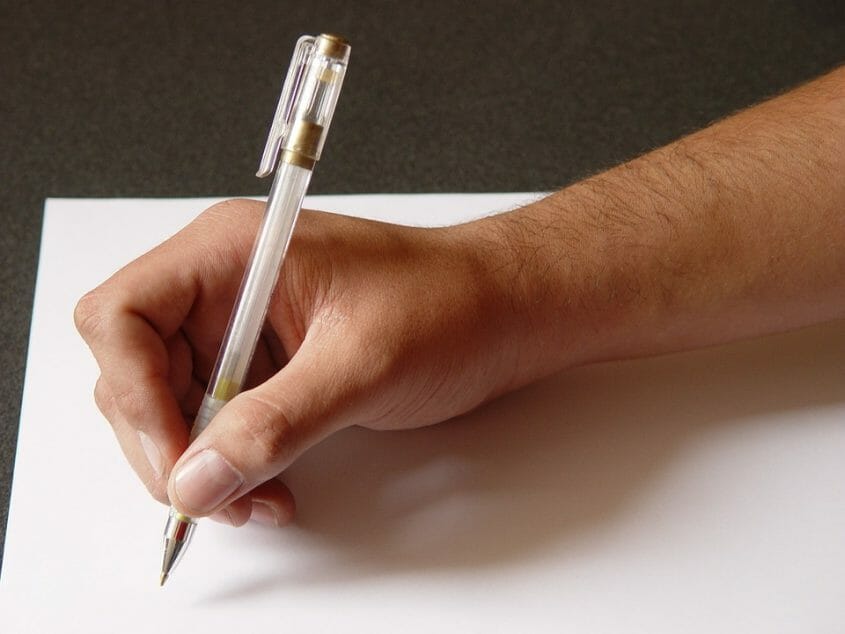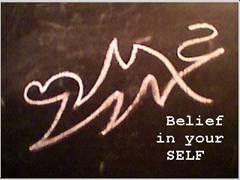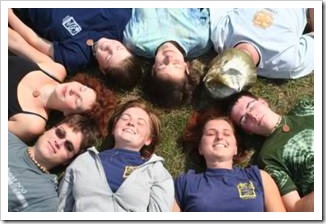
After a full day of me challenging the way they think and manage themselves, the kids were relaxing at dinner and we heard laughs and discussions from tables all around. In came the girl from the office, holding envelopes in her hand. “You’ve got mail”, she said and the kids rushed from their tables to mine and wondered who she was talking to.
(To find out about the parent’s preparations, please read this post.)
I held up each envelope, acting as surprised as they were, and said, “Oh, this is for Jack … and this is for Amy” and gave each one of them their letter. Among the kids’ letters, I got a letter from Gal, Derek, the principal who had organized the camp with me and attended the camp, got a letter from his wife and so did Ahmad, the other presenter.
At first, there was an excited buzz around the room, but as soon as the letters were opened, there was total silence. The kids left my table and each found a corner to read their letters. Some of them seemed to be crying. For about 10 minutes, no one said anything.
Then, the kids started looking at each other, trying to figure out what others were going through. We, the adults, also read our letters, which were given to us sealed by our partners.

Slowly, the kids came closer to one another and started asking, “What did you get?” At that point, I asked them all to join me in one of the boys’ rooms. The girls were hesitant (“boy germs”), but then comforted themselves by saying, “But Ronit is there”, and followed me to the room. There were 3 bunk beds, so there were kids sitting everywhere.
I cannot reveal the names of the kids, but I want you to know what I said and what the kids said, so I am going to write my name and the other presenters’ names for you to understand what happened there.
Ronit: “What happened?”
Students: “We got letters”
Ronit: “What do you think about it?”
Student: “It’s a letter for camp”
Student: “You wrote the letters”
Student: “Yes, Ronit wrote the letters to all of us”
Student: “Mine is not from Ronit. It’s from my mom”
Student: “Mine is from my dad”
Student (not the same student who suggested it at first): “It can still be from Ronit”
Student: “Mine is from both”
Student: “Mine was written by my brother, but it’s from the whole family” (some kids’ parents could not write in English and got an older sibling to write their letter)

Student: “Ronit couldn’t have written it. It has my sister’s name on it and Ronit doesn’t know my sister”
Student: “It’s easy to find the name of your sister. She could ask”
Another student: “It couldn’t have been Ronit. Only my mom calls me <special nickname>”
Another student: “It’s not Ronit. It’s my mom’s writing paper, see?”
Student: “Anyone can buy colorful paper”
Student: “Yours and mine are different” (looking at the other one’s letter) “Yours is on a different paper and in different handwriting”
Student: “Mine is from my mom. I recognize her handwriting”
This conversation took over 15 minutes, with about 30 kids trying to figure out who had written them those letters. Since what they had read was private, they had not looked at each other’s letters to notice they had different paper, handwriting and signatures”.
I sat there, listening to them convincing each other it was not me. Surprisingly, as they managed to get convinced, the tension started building and I heard some sniffling and saw a roll of toilet paper being passed from one bed to another.
“How do you feel?” I asked after hearing kids (both boys and girls) cry.
One boy said, “I feel special”.
Another one said, “I never knew my dad thought I was his best friend” and started crying. The other kids felt embarrassed and started giggling.
Derek said to him, “It’s OK to feel… It’s a great discovery” and told the kids a story of something that happened to him when he had cancer that had made him cry.

Ahmad told the kids a story about leaving a job he had loved very much because of an injustice done to one of the other teachers and how he had stood on stage and had said goodbye to all his students, knowing he would not come back to teach them for standing up to injustice.
I was so happy Derek and Ahmed were there, because their stories gave all the boys permission to cry. Hearing from grown up men, a school principal (godly figure to the kids) and an Imam (Muslim scholar and leader of prayer) sad stories that had made them cry was much better than hearing Ronit telling about something sad that had made her cry.
One by one, the kids asked to read their letters aloud. Some read the whole letter and other just read parts. At first, only the brave ones spoke. It took courage to read their nicknames aloud. One boy talked about his feelings, but said he would rather keep the letter private.
“I never knew she loved me. My parents never say ‘I love you!'” one of the kids said and the tears started pouring down again.
“I knew my dad loved me, but it’s always nice to see it like this”, said another.
They then started a discussion about loving and saying “I love you”.
When the conversation got stuck, Ahmad, Derek or I asked them a question that restarted it. When they stopped talking, I asked, “Does anyone else want to share with us their letter, parts of it or feelings and thoughts about the letter?”

One of the students, who was intellectually impaired, asked to read his letter. His reading level was that of Grade 2. The boy sitting next to him whispered the words from his mom’s letter to him. The rest waited patiently while he struggled to read.
This year, the question whether I had written the letters did not pop up. One girl opened a huge envelope and pulled out a decorated card with her name in big letters. She knew immediately it was from her mom.
We went into my room, which had two beds in it, and most of the kids squeezed onto the blankets we put on the floor. The tears started immediately after I asked “What just happened?” This time, no one offered to share. Boys and girls cried and the rest just sat next to them and tried to comfort them.
I asked, “Who would like to share something with us?”
They all looked at me surprised, some with tears and others with sparkling eyes. One girl who cried on her friend’s shoulder asked her friend to read her letter to her. Strangely, even those who finished reading a letter to their friend preferred to have their letter read by their friend, rather than reading it themselves. I decided to find out why (the names are just for illustration purposes).

Ronit: “Beth, why do you need Jessica to read the letter for you?” I asked. Just minutes before, Jessica had read Beth’s letter to everyone.
“Because it is embarrassing to read out loud good things about yourself”, Beth said. There was a buzz in the room as many kids nodded in agreement.
“Beth, how did you feel when you read your mum’s letter?” I asked.
“Happy… Special… Proud”, she said.
“How did you feel when Jessica read it to the class?”
“… The same”.
“So why is it different?”
“I don’t know. When I read it myself, it’s like I’m bragging”, she said.
That started a whole discussion about bragging. For most of the kids, saying good things about themselves was the same as bragging. I was very surprised, because these kids were student leaders in Grade 7 (the top class in primary school), but they viewed being proud as a negative thing.
I will tell you about that discussion next week, so come back or subscribe.
Until then, write your kids a letter of confidence and love, because most of them do not know you love them and believe in them and if they do, they may not know how much. They would love to have it in writing to keep forever and read in low times when doubt creeps in.
I also promise to share some of the letters here for your inspiration.
Happy parenting,
Ronit
This post is part of the series I Believe in You:
- I Believe in You (1): The parents
- I Believe in You (2): The kids
- I believe in you (3): Being Proud
- I Believe in You (4): The Letters of Encouragement











